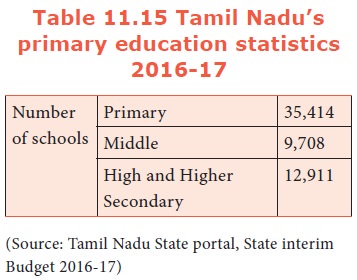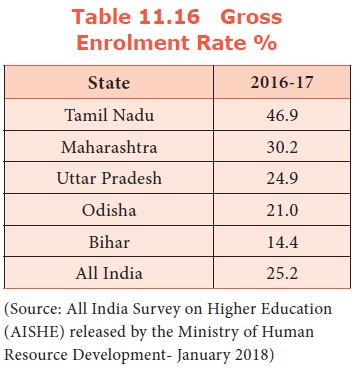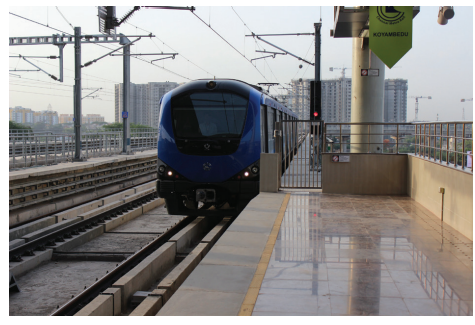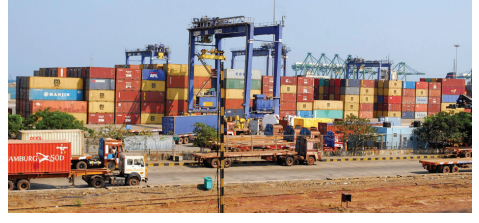Chapter: 11th Economics : Chapter 11 : Tamil Nadu Economy
Services - Tamil Nadu Economy
SERVICES
Banking,
insurance, energy, transport and communication fall under tertiary sector i.e.,
services.
1. Banking
In Tamil
Nadu, Nationalised banks account for 52% with 5,337 branches, Private
Commercial Banks 30% (3,060) branches, State Bank of India and its associates
13% (1,364), Regional Rural Banks 5% (537) branches and the remaining 22
foreign bank branches.
Total
deposits of the banks in Tamil Nadu registered an year-on year increase of
14.32% by March 2017 and touched Rs.6,65,068.59
crores. Total credit of the banks in Tamil Nadu registered a year-on year
increase of 13.50% by March 2017 and touched Rs.6,95,500.31 crores. The share of Priority
Sector Advances stands at 45.54% as against the national average of 40%. The
percentage of Agricultural advances to total advances as at the end of March
2017 works out to 19.81% as against the national average of 18%. Banks in Tamil
Nadu have maintained one of the highest Credit Deposit Ratio of 119.15% in the
country whereas this ratio is 77.5% at the national level.
2. Education
a. School Education
Tamil
Nadu is grouped among high Gross Enrolement Ratio (GER) States. It ranks third
next only to Kerala (81%) and Himachal Pradesh (74%). The all India average is
43% and the world average is 59%.

Gross
Enrolment Ratio is 118.8% for primary level(class 1- 5); 112.3% for upper
primary level (class 6-8), 62.7% for secondary level (class 9-10), 49.26% at
Higher Secondary level (class 11-12). This has been possible mainly due to the
supply of free food, cloth, foot-wear, scholarship, laptop etc.
b. Higher Education
In Gross
Enrolment Ratio under higher education (Tertiary level) Tamil Nadu continues to
be at the top level well ahead of other states. The GER is 46.9% in Tamil Nadu
which is far higher against national average and all other States This higher
GER is thanks to the distribution of free food,cloth, footwear, laptop and
scholarship.

Tamil
Nadu has 59 Universities, 40 Medical colleges, 517 Engineering colleges, 2,260
Arts and Science colleges, 447 Polytechnics and 20 dental colleges. Tamil Nadu
produces nearly four lakh engineering and polytechnic students every year, the
highest in the country.
3. Educational Loans
As far as
educational loans disbursed by Public Sector Banks under priority sector are
concerned, 20.8% of the total amount was disbursed in Tamil Nadu between
2013-14 and 2015-16. Andhra Pradesh was second with 11.2% of the total loan
amount followed by Maharashtra (10.2%).
Of the
total amount of educational loans disbursed by Private Banks during the same
period, Kerala accounted for 37.8% followed by Tamil Nadu with 24.8%. Both
Karnataka & Kerala together accounted for more than 60% of the total
educational loan amount by Private Banks.
4. Health
Tamil
Nadu has a three – tier health infrastructure comprising hospitals, primary
health centres, health units, community health centres and sub-centres. As of
March 2015, the State had district hospitals, 229 sub-divisional hospitals,
1,254 primary health centres, 7,555 Sub-centres and 313 community health
centres.
5. Communication
Maharashtra
has the highest number of internet subscribers in the country at 29.47 million,
followed by States like Tamil Nadu, Andhra Pradesh and Karnataka.
According
to government data, India had a total of 342.65 million internet subscribers at
the end of March, 2016. Tamil Nadu had 28.01 million subscribers, while its
neighbours Andhra Pradesh and Karnataka had 24.87 million and 22.63 million,
respectively.
6. Transport
Tamil
Nadu has a well established transportation system that connects all parts of
the State. This is partly responsible for the investment in the State. Tamil
Nadu is served by an extensive road network in terms of its spread and quality,
providing links between urban centres, agricultural market-places and rural
habitations in the countryside. However, there is scope for improvement.
a. Road
There are
28 national highways in the State, covering a total distance of 5,036 km. The
State has a total road length of 167,000 km, of which 60,628 km are maintained
by Highways Department. It ranks second in India with a share of over 20% in
total road projects under operation in the public-private partnership (PPP)
model.
b. Rail
Tamil
Nadu has a well-developed rail network as part of Southern Railway,
Headquartered at Chennai. The present Southern Railway network extends over a
large area of India’s Southern Peninsula, covering the States of Tamil Nadu,
Kerala, Puducherry, minor portions of Karnataka and Andhra Pradesh. Tamil Nadu
has a total railway track length of 6,693 km and there are690 railway stations
in the State. The systemconnects it with most major cities in India. Main rail
junctions in the State include Chennai, Coimbatore, Erode, Madurai, Salem,
Tiruchirapalli and Tirunelveli. Chennai has a well-established Suburban Railway
network, a Mass Rapid Transport System and is currently developing a Metro
system, with its first underground stretch operational since May 2017.

c. Air
Tamil
Nadu has four major international airports. Chennai International Airport is
currently the third largest airport in India after Mumbai and Delhi. Other
international airports in Tamil Nadu include Coimbatore International Airport,
Madurai International Airport and Tiruchirapalli International Airport. It also
has domestic airports at Tuticorin, Salem, and Madurai. which connect several
parts of the country. Increased industrial activity has given rise to an
increase in passenger traffic as well as freight movement which has been
growing at over 18 per cent per year.
d. Ports
Tamil
Nadu has three major ports; one each at Chennai, Ennore, and Tuticorin, as well
as one intermediate port in Nagapattinam, and 23 minor ports. The ports are
currently capable of handling over 73 million metric tonnes of cargo annually (24
per cent share of India). All the minor portsare managed by the Tamil Nadu
Maritime Board, Chennai Port. This is an artificial harbour and the second
principal port in the country for handling containers. It is currently being
upgraded to have a dedicated terminal for cars capable of handling 4,00,000
vehicles. Ennore Port was recently converted from an intermediate port to a
major port and handles all the coal and ore traffic in Tamil Nadu.

Related Topics